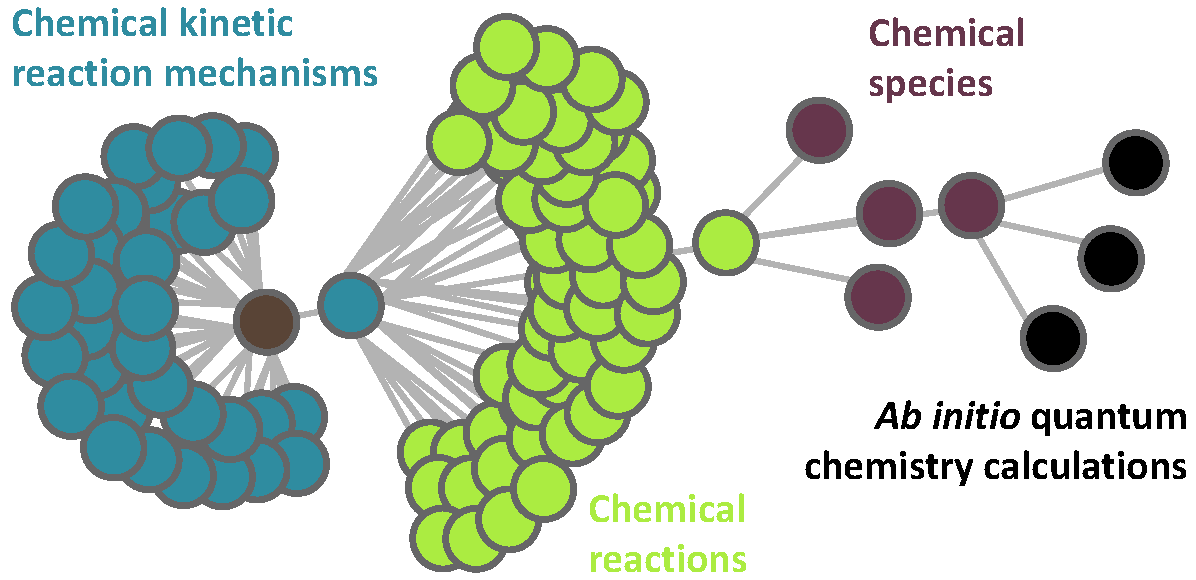Technical Report 236, c4e-Preprint Series, Cambridge
Linking Reaction Mechanisms and Quantum Chemistry: An Ontological Approach
Reference: Technical Report 236, c4e-Preprint Series, Cambridge, 2019
- A framework is built to link chemical species in mechanisms and quantum calculations.
- Existing ontologies are extended to represent species interconnections and provenance.
- OntoSpecies, an ontology for uniquely representing chemical species, is created.
- Knowledge-representational agents are implemented to populate knowledge-bases.
- A computational agent to calculate thermodynamic data for each species is developed.
 In this paper, a linked-data framework for connecting species in chemical kinetic reaction mechanisms with quantum calculations is presented. A mechanism can be constructed from thermodynamic, reaction rate, and transport data that has been obtained either experimentally, computationally, or by a combination of both. This process in practice requires multiple sources of data, which raises several issues. For example, the same species may have been given different names by different authors, whereas other species may have been given the same name even though they are distinct entities. Secondly, thermodynamic, reaction rate, and transport data may be inconsistent, with large variations outside stated error bounds between different sources. A linked data-centric knowledge-graph approach is taken in this work to
address these challenges. In order to implement this approach, two existing ontologies, namely OntoKin, for representing chemical kinetic reaction mechanisms, and OntoCompChem, for representing quantum chemistry calculations, are extended. In addition, a new ontology, which we call OntoSpecies, is developed for uniquely representing chemical species. The framework also includes agents to populate and link knowledge-bases created through the instantiation of these ontologies. In addition, the developed knowledge-graph and agents naturally form a part of the J-Park Simulator (JPS) - an Industry 4.0 platform which combines linked data and an eco-system of autonomous agents for cross-domain applications. The functionality of the framework is demonstrated via a use-case based on a hydrogen combustion mechanism.
In this paper, a linked-data framework for connecting species in chemical kinetic reaction mechanisms with quantum calculations is presented. A mechanism can be constructed from thermodynamic, reaction rate, and transport data that has been obtained either experimentally, computationally, or by a combination of both. This process in practice requires multiple sources of data, which raises several issues. For example, the same species may have been given different names by different authors, whereas other species may have been given the same name even though they are distinct entities. Secondly, thermodynamic, reaction rate, and transport data may be inconsistent, with large variations outside stated error bounds between different sources. A linked data-centric knowledge-graph approach is taken in this work to
address these challenges. In order to implement this approach, two existing ontologies, namely OntoKin, for representing chemical kinetic reaction mechanisms, and OntoCompChem, for representing quantum chemistry calculations, are extended. In addition, a new ontology, which we call OntoSpecies, is developed for uniquely representing chemical species. The framework also includes agents to populate and link knowledge-bases created through the instantiation of these ontologies. In addition, the developed knowledge-graph and agents naturally form a part of the J-Park Simulator (JPS) - an Industry 4.0 platform which combines linked data and an eco-system of autonomous agents for cross-domain applications. The functionality of the framework is demonstrated via a use-case based on a hydrogen combustion mechanism.
Material from this preprint has been published in Computers & Chemical Engineering.
PDF (3.4 MB)



